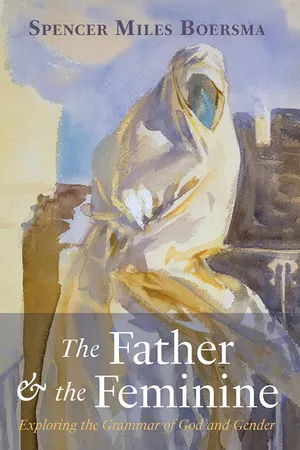
The Father and the Feminine
Exploring the Grammar of God and Gender
- 262 pages
- English
- ePUB (mobile friendly)
- Available on iOS & Android
About this book
How should Christians speak of the transcendent yet personal God when our language for persons is almost always gendered? Is male imagery--such as Father, Son, or King--the only appropriate way? Are there ways to talk of God using female-gendered metaphors and pronouns? And how does the use of such language impact humans as gendered people? Moving beyond the extremes in this debate, The Father and the Feminine seeks to clarify the ways Christians speak about God: whether this is by recognizing revelation and Christian tradition; upholding God's ineffability; using analogies, metaphors, and narratives; referring to God as Father, Son, and Spirit; or by seeking a liberating way of life in community. Spencer Miles Boersma argues that male language for God need not be problematic if used and understood correctly but, at the same time, that it cannot be the exclusive way Christians speak of the Divine. The grammar of Christian Scripture and tradition both authorize the use of female language, which Christians ought to use in pursuing a deeper relationship with God and others, as well as a more authentic view of self.
Frequently asked questions
- Essential is ideal for learners and professionals who enjoy exploring a wide range of subjects. Access the Essential Library with 800,000+ trusted titles and best-sellers across business, personal growth, and the humanities. Includes unlimited reading time and Standard Read Aloud voice.
- Complete: Perfect for advanced learners and researchers needing full, unrestricted access. Unlock 1.4M+ books across hundreds of subjects, including academic and specialized titles. The Complete Plan also includes advanced features like Premium Read Aloud and Research Assistant.
Please note we cannot support devices running on iOS 13 and Android 7 or earlier. Learn more about using the app.
Information
Table of contents
- Title Page
- Introduction
- Chapter 1: Revelation and Liberation
- Chapter 2: Ineffability and Idolatry
- Chapter 3: Analogy and Narrative
- Chapter 4: Christ and the Cross
- Chapter 5: Spirit and Sophia
- Chapter 6: Trinity and Mutuality
- Chapter 7: Conclusion
- Bibliography